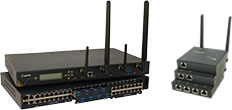
Government data centers will face unique barriers as they consolidate
By Donna DonnowitzSeptember 17, 2014
Several government data centers are currently in the midst of consolidation, following the passage of a cost-cutting measures in late 2013. The Federal Data Center Consolidation Act of 2013 requires the government to reduce its total number of data centers by 40 percent in 2015, and the bill stands to free up $3 billion in the federal budget, according to the Congressional Budget Office. Unfortunately, this rapid consolidation plan may have severe consequences for the entirety of the federal government's data center operations. The transition also reveals the dangers of scaling a data center, either through expansion or consolidation, too quickly.
Reduced resiliency
Redundancy is one of the pillars of resiliency. Every data center occasionally fails, and companies lacking a comprehensive backup strategy put themselves at a huge disadvantage. By forcibly consolidating data centers, allowing less space for redundant hardware, the federal government is also reducing the resiliency of every hosted network. Data centers that were once protected from four or five faults will eventually be only able to handle two or three.
A 40 percent consolidation will also make each instance of data center failure more severe, according to Nextgov. The performance of each rack in the data center becomes more vital with every stage of consolidation; each machine must host a larger volume of critical data when less space is available to distribute sensitive information.
Weakened security
Security becomes a greater issue as government data centers consolidate for many of the same logistical reasons that hamper resiliency. Greater consolidation translates to fewer machines and fewer locations to store classified files. This change in hardware infrastructure minimizes a data center's total number of access points, but also limits space to construct digital barriers against network attacks. Consolidation also leads to the centralizing of important data, and this strategy allows hackers to focus their efforts on a single target.
Increased maintenance
Nextgov predicts that government agencies will have to devote greater investments toward network security and maintenance. Fewer data centers requires each facility to recover from outages as soon as possible, and a dedicated team of IT professionals is necessary to consistently rebound from network issues. Government agencies are also likely to increase remote monitoring at current facilities as a way to offset the reduction in data centers. Federal employees can use remote console servers to observe the network from a distance and report potential maintenance or security problems immediately.
Perle's wide range of 1 to 48 port Perle Console Servers provide data center managers and network administrators with secure remote management of any device with a serial console port. Plus, they are the only truly fault tolerant Console Servers on the market with the advanced security functionality needed to easily perform secure remote data center management and out-of-band management of IT assets from anywhere in the world.



